Exploring Health Issues: Schizophrenia Among Black Africans in the UK
VerifiedAdded on 2024/06/07
|12
|3366
|479
Report
AI Summary
This report explores the prevalence of schizophrenia within the Black African Caribbean community in the UK, attributing its high incidence to social stressors related to their minority status. It examines the challenges faced by this community, including social isolation in the workplace, and delves into the causes and consequences of the disorder. The analysis is supported by a review of peer-reviewed articles, leading to recommendations such as stricter enforcement of anti-discrimination policies and promoting education to foster progressive thinking. The report emphasizes the need for more effective governmental programs to improve the living conditions and mental well-being of Africans in the UK, addressing issues like cultural bias in healthcare and promoting a socio-developmental model to prevent misdiagnosis and improve treatment outcomes.
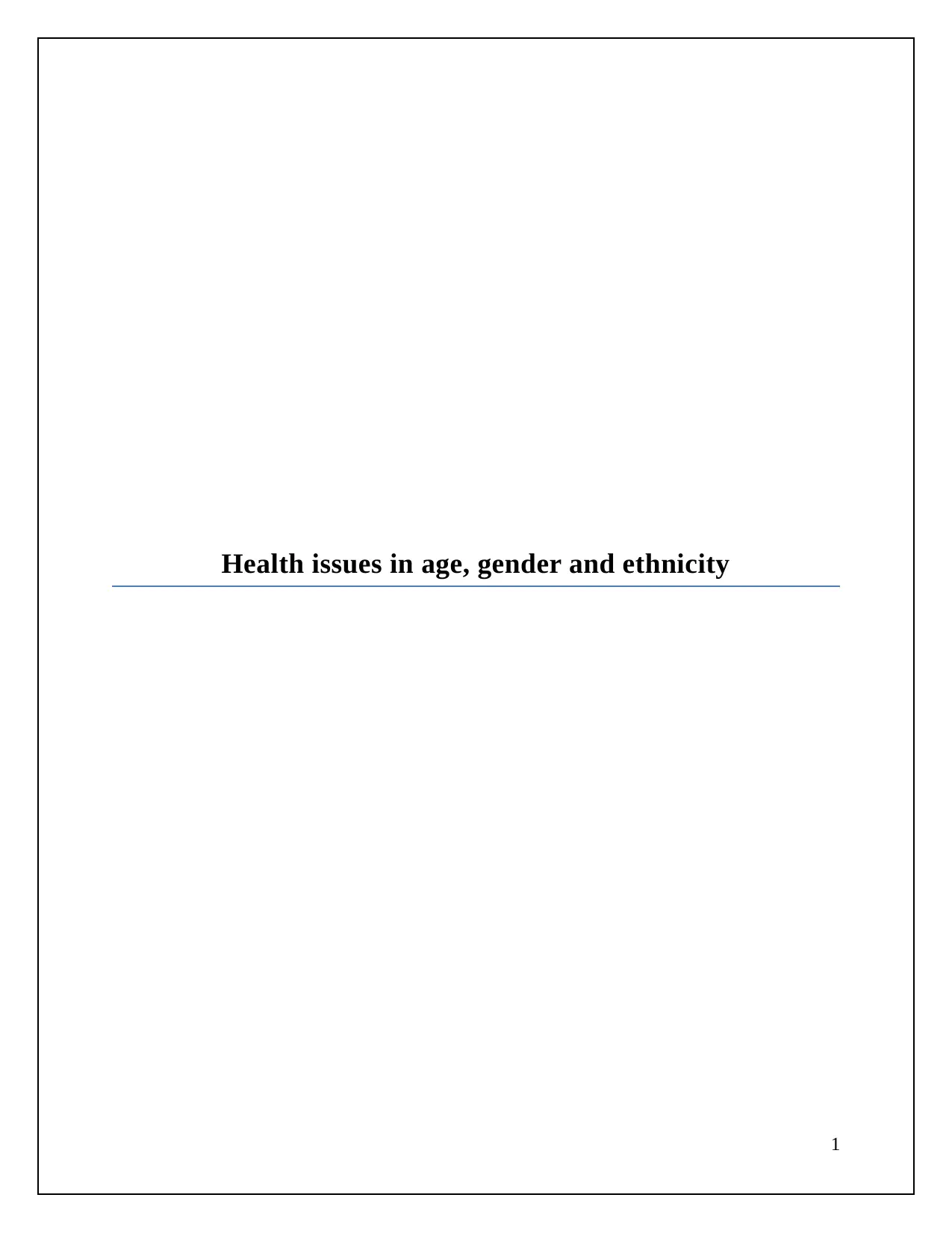
Health issues in age, gender and ethnicity
1
1
Paraphrase This Document
Need a fresh take? Get an instant paraphrase of this document with our AI Paraphraser
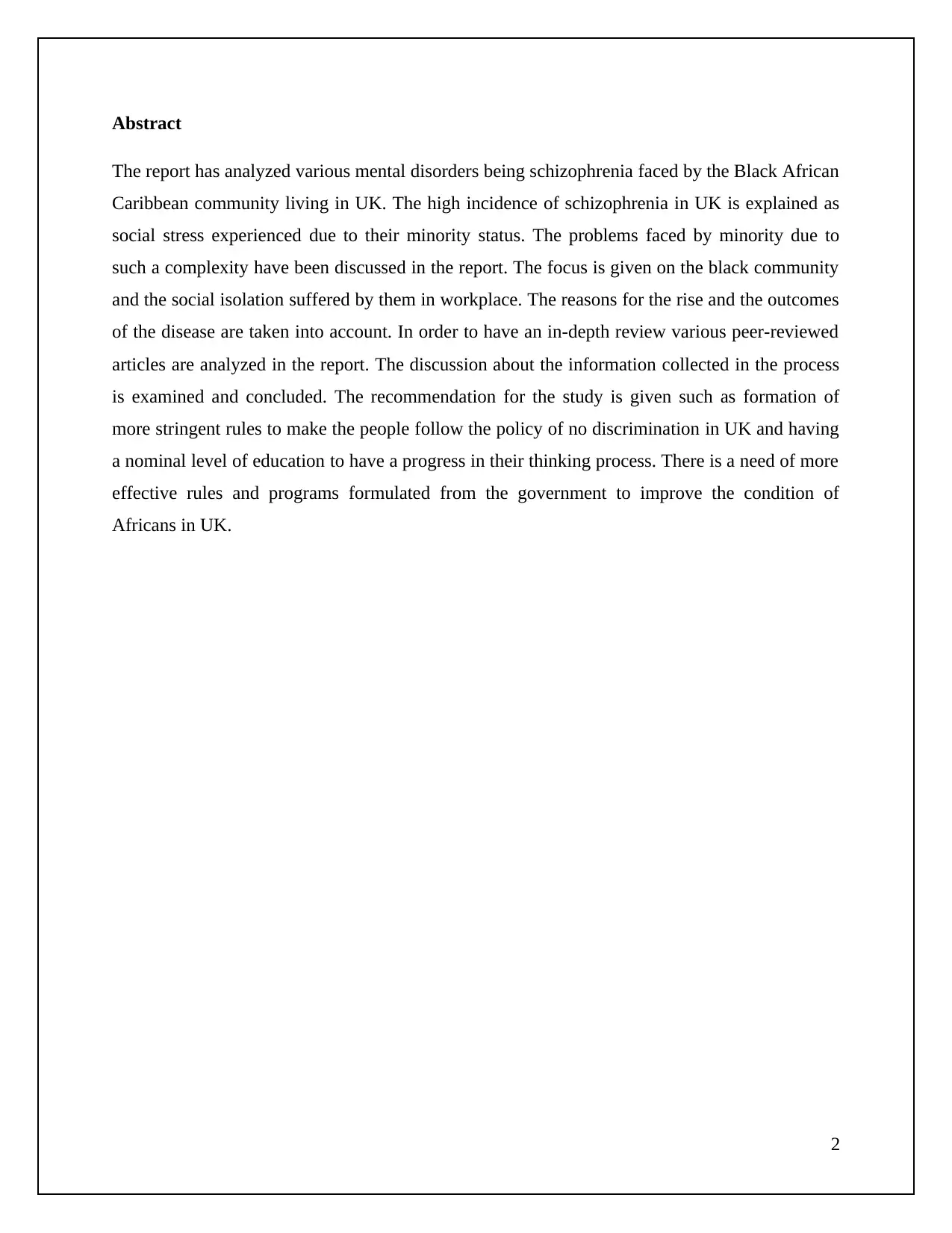
Abstract
The report has analyzed various mental disorders being schizophrenia faced by the Black African
Caribbean community living in UK. The high incidence of schizophrenia in UK is explained as
social stress experienced due to their minority status. The problems faced by minority due to
such a complexity have been discussed in the report. The focus is given on the black community
and the social isolation suffered by them in workplace. The reasons for the rise and the outcomes
of the disease are taken into account. In order to have an in-depth review various peer-reviewed
articles are analyzed in the report. The discussion about the information collected in the process
is examined and concluded. The recommendation for the study is given such as formation of
more stringent rules to make the people follow the policy of no discrimination in UK and having
a nominal level of education to have a progress in their thinking process. There is a need of more
effective rules and programs formulated from the government to improve the condition of
Africans in UK.
2
The report has analyzed various mental disorders being schizophrenia faced by the Black African
Caribbean community living in UK. The high incidence of schizophrenia in UK is explained as
social stress experienced due to their minority status. The problems faced by minority due to
such a complexity have been discussed in the report. The focus is given on the black community
and the social isolation suffered by them in workplace. The reasons for the rise and the outcomes
of the disease are taken into account. In order to have an in-depth review various peer-reviewed
articles are analyzed in the report. The discussion about the information collected in the process
is examined and concluded. The recommendation for the study is given such as formation of
more stringent rules to make the people follow the policy of no discrimination in UK and having
a nominal level of education to have a progress in their thinking process. There is a need of more
effective rules and programs formulated from the government to improve the condition of
Africans in UK.
2

Table of Contents
Introduction......................................................................................................................................4
Methods...........................................................................................................................................4
Findings...........................................................................................................................................5
Discussion........................................................................................................................................8
Conclusion and Recommendation...................................................................................................9
References......................................................................................................................................10
3
Introduction......................................................................................................................................4
Methods...........................................................................................................................................4
Findings...........................................................................................................................................5
Discussion........................................................................................................................................8
Conclusion and Recommendation...................................................................................................9
References......................................................................................................................................10
3
⊘ This is a preview!⊘
Do you want full access?
Subscribe today to unlock all pages.

Trusted by 1+ million students worldwide
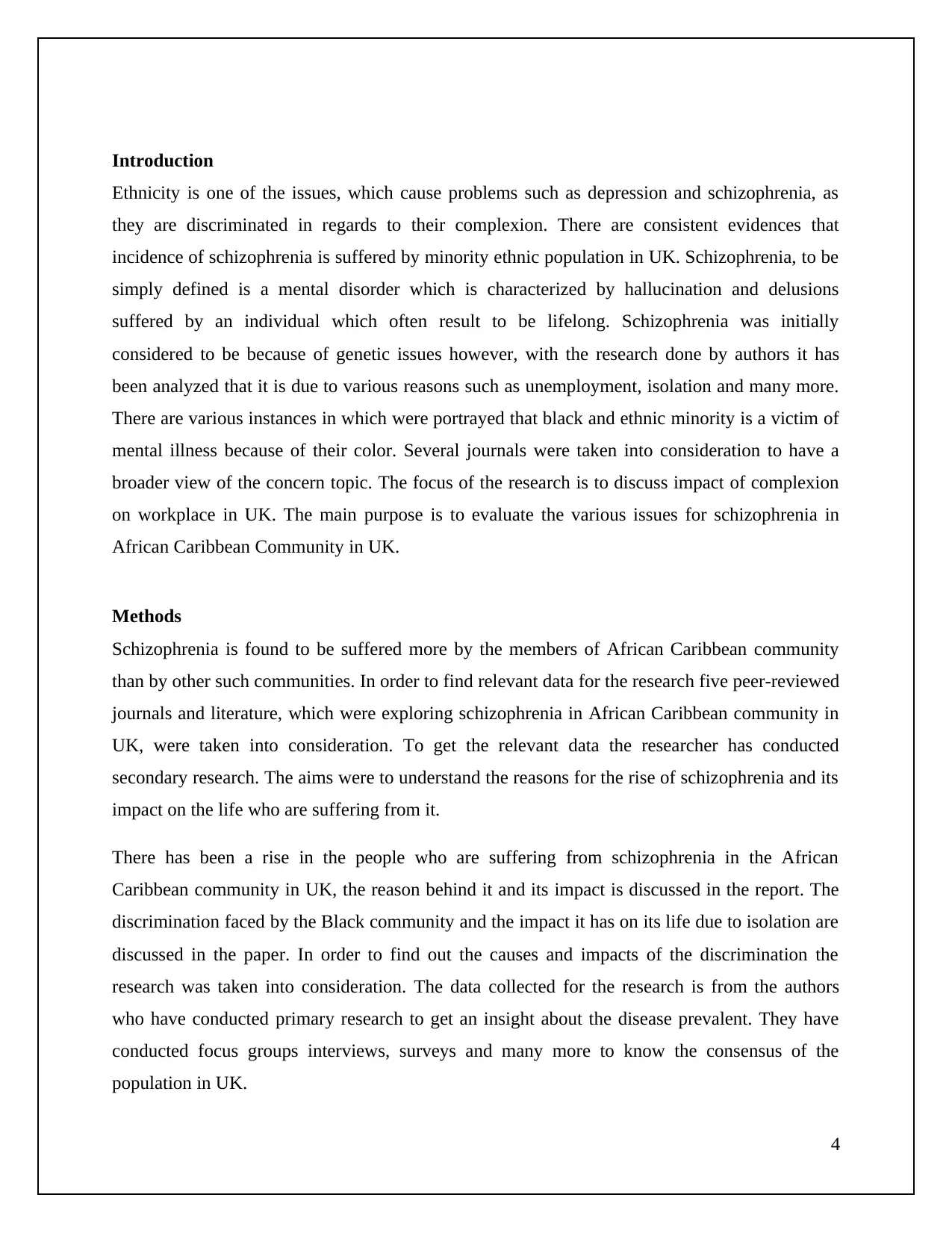
Introduction
Ethnicity is one of the issues, which cause problems such as depression and schizophrenia, as
they are discriminated in regards to their complexion. There are consistent evidences that
incidence of schizophrenia is suffered by minority ethnic population in UK. Schizophrenia, to be
simply defined is a mental disorder which is characterized by hallucination and delusions
suffered by an individual which often result to be lifelong. Schizophrenia was initially
considered to be because of genetic issues however, with the research done by authors it has
been analyzed that it is due to various reasons such as unemployment, isolation and many more.
There are various instances in which were portrayed that black and ethnic minority is a victim of
mental illness because of their color. Several journals were taken into consideration to have a
broader view of the concern topic. The focus of the research is to discuss impact of complexion
on workplace in UK. The main purpose is to evaluate the various issues for schizophrenia in
African Caribbean Community in UK.
Methods
Schizophrenia is found to be suffered more by the members of African Caribbean community
than by other such communities. In order to find relevant data for the research five peer-reviewed
journals and literature, which were exploring schizophrenia in African Caribbean community in
UK, were taken into consideration. To get the relevant data the researcher has conducted
secondary research. The aims were to understand the reasons for the rise of schizophrenia and its
impact on the life who are suffering from it.
There has been a rise in the people who are suffering from schizophrenia in the African
Caribbean community in UK, the reason behind it and its impact is discussed in the report. The
discrimination faced by the Black community and the impact it has on its life due to isolation are
discussed in the paper. In order to find out the causes and impacts of the discrimination the
research was taken into consideration. The data collected for the research is from the authors
who have conducted primary research to get an insight about the disease prevalent. They have
conducted focus groups interviews, surveys and many more to know the consensus of the
population in UK.
4
Ethnicity is one of the issues, which cause problems such as depression and schizophrenia, as
they are discriminated in regards to their complexion. There are consistent evidences that
incidence of schizophrenia is suffered by minority ethnic population in UK. Schizophrenia, to be
simply defined is a mental disorder which is characterized by hallucination and delusions
suffered by an individual which often result to be lifelong. Schizophrenia was initially
considered to be because of genetic issues however, with the research done by authors it has
been analyzed that it is due to various reasons such as unemployment, isolation and many more.
There are various instances in which were portrayed that black and ethnic minority is a victim of
mental illness because of their color. Several journals were taken into consideration to have a
broader view of the concern topic. The focus of the research is to discuss impact of complexion
on workplace in UK. The main purpose is to evaluate the various issues for schizophrenia in
African Caribbean Community in UK.
Methods
Schizophrenia is found to be suffered more by the members of African Caribbean community
than by other such communities. In order to find relevant data for the research five peer-reviewed
journals and literature, which were exploring schizophrenia in African Caribbean community in
UK, were taken into consideration. To get the relevant data the researcher has conducted
secondary research. The aims were to understand the reasons for the rise of schizophrenia and its
impact on the life who are suffering from it.
There has been a rise in the people who are suffering from schizophrenia in the African
Caribbean community in UK, the reason behind it and its impact is discussed in the report. The
discrimination faced by the Black community and the impact it has on its life due to isolation are
discussed in the paper. In order to find out the causes and impacts of the discrimination the
research was taken into consideration. The data collected for the research is from the authors
who have conducted primary research to get an insight about the disease prevalent. They have
conducted focus groups interviews, surveys and many more to know the consensus of the
population in UK.
4
Paraphrase This Document
Need a fresh take? Get an instant paraphrase of this document with our AI Paraphraser
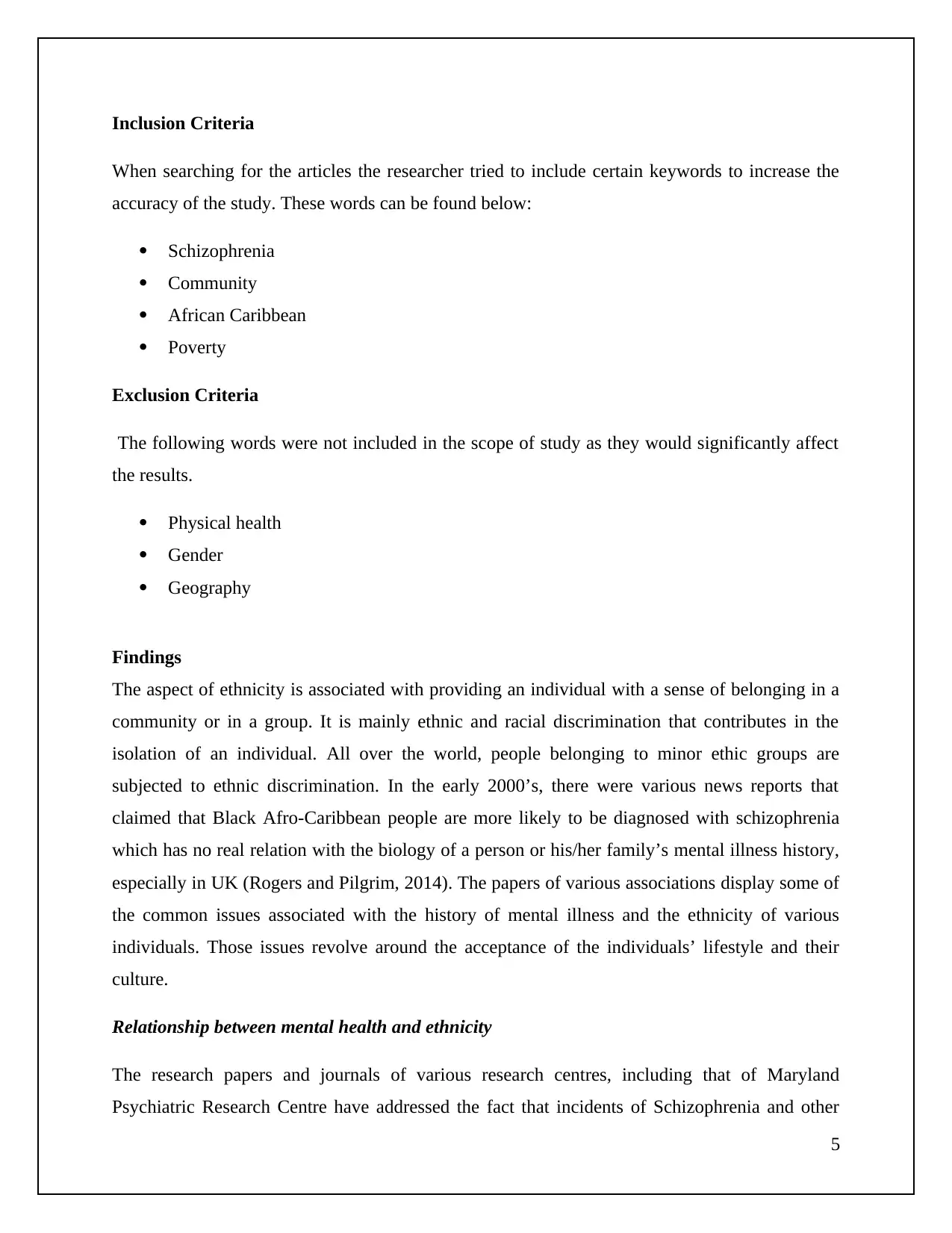
Inclusion Criteria
When searching for the articles the researcher tried to include certain keywords to increase the
accuracy of the study. These words can be found below:
Schizophrenia
Community
African Caribbean
Poverty
Exclusion Criteria
The following words were not included in the scope of study as they would significantly affect
the results.
Physical health
Gender
Geography
Findings
The aspect of ethnicity is associated with providing an individual with a sense of belonging in a
community or in a group. It is mainly ethnic and racial discrimination that contributes in the
isolation of an individual. All over the world, people belonging to minor ethic groups are
subjected to ethnic discrimination. In the early 2000’s, there were various news reports that
claimed that Black Afro-Caribbean people are more likely to be diagnosed with schizophrenia
which has no real relation with the biology of a person or his/her family’s mental illness history,
especially in UK (Rogers and Pilgrim, 2014). The papers of various associations display some of
the common issues associated with the history of mental illness and the ethnicity of various
individuals. Those issues revolve around the acceptance of the individuals’ lifestyle and their
culture.
Relationship between mental health and ethnicity
The research papers and journals of various research centres, including that of Maryland
Psychiatric Research Centre have addressed the fact that incidents of Schizophrenia and other
5
When searching for the articles the researcher tried to include certain keywords to increase the
accuracy of the study. These words can be found below:
Schizophrenia
Community
African Caribbean
Poverty
Exclusion Criteria
The following words were not included in the scope of study as they would significantly affect
the results.
Physical health
Gender
Geography
Findings
The aspect of ethnicity is associated with providing an individual with a sense of belonging in a
community or in a group. It is mainly ethnic and racial discrimination that contributes in the
isolation of an individual. All over the world, people belonging to minor ethic groups are
subjected to ethnic discrimination. In the early 2000’s, there were various news reports that
claimed that Black Afro-Caribbean people are more likely to be diagnosed with schizophrenia
which has no real relation with the biology of a person or his/her family’s mental illness history,
especially in UK (Rogers and Pilgrim, 2014). The papers of various associations display some of
the common issues associated with the history of mental illness and the ethnicity of various
individuals. Those issues revolve around the acceptance of the individuals’ lifestyle and their
culture.
Relationship between mental health and ethnicity
The research papers and journals of various research centres, including that of Maryland
Psychiatric Research Centre have addressed the fact that incidents of Schizophrenia and other
5
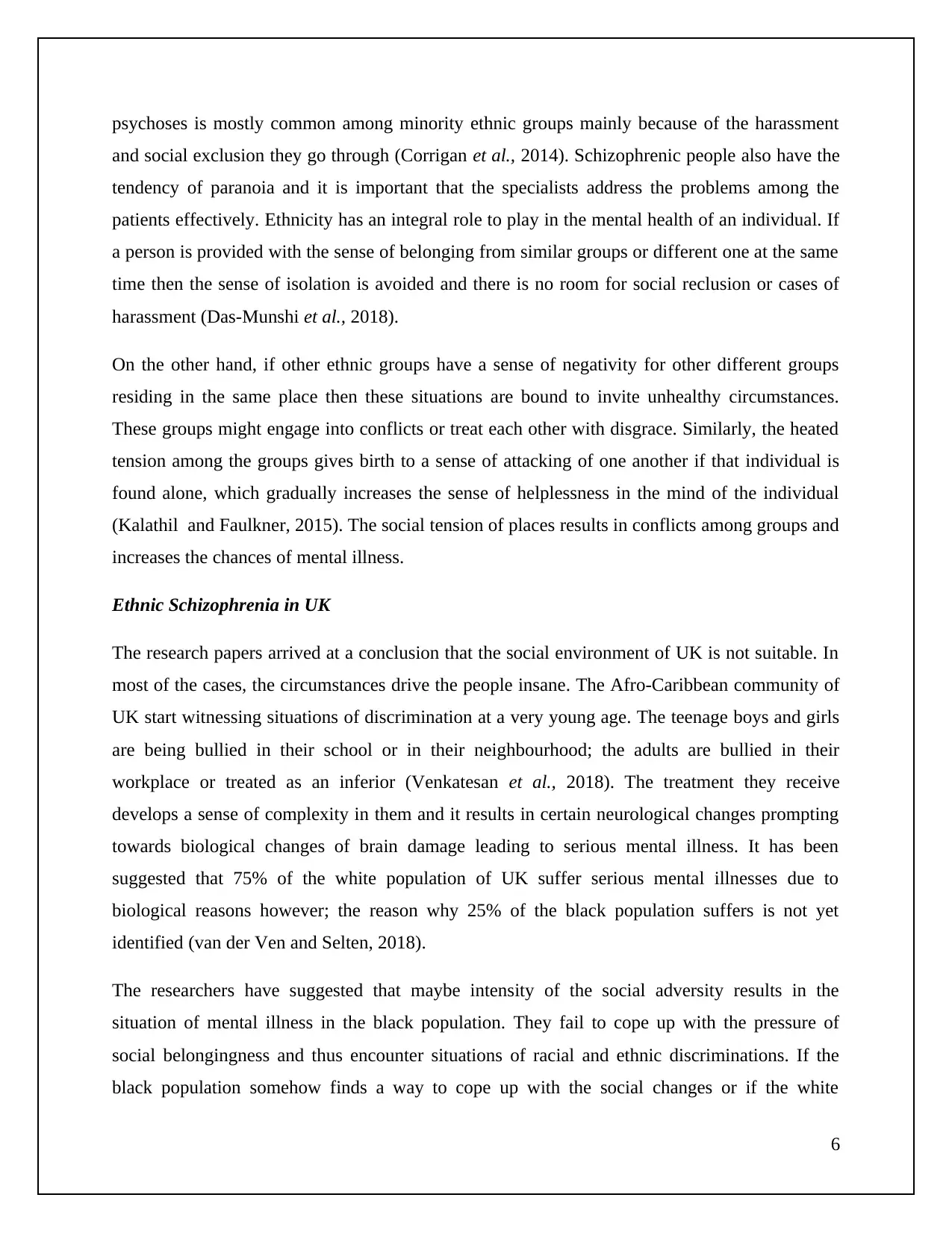
psychoses is mostly common among minority ethnic groups mainly because of the harassment
and social exclusion they go through (Corrigan et al., 2014). Schizophrenic people also have the
tendency of paranoia and it is important that the specialists address the problems among the
patients effectively. Ethnicity has an integral role to play in the mental health of an individual. If
a person is provided with the sense of belonging from similar groups or different one at the same
time then the sense of isolation is avoided and there is no room for social reclusion or cases of
harassment (Das-Munshi et al., 2018).
On the other hand, if other ethnic groups have a sense of negativity for other different groups
residing in the same place then these situations are bound to invite unhealthy circumstances.
These groups might engage into conflicts or treat each other with disgrace. Similarly, the heated
tension among the groups gives birth to a sense of attacking of one another if that individual is
found alone, which gradually increases the sense of helplessness in the mind of the individual
(Kalathil and Faulkner, 2015). The social tension of places results in conflicts among groups and
increases the chances of mental illness.
Ethnic Schizophrenia in UK
The research papers arrived at a conclusion that the social environment of UK is not suitable. In
most of the cases, the circumstances drive the people insane. The Afro-Caribbean community of
UK start witnessing situations of discrimination at a very young age. The teenage boys and girls
are being bullied in their school or in their neighbourhood; the adults are bullied in their
workplace or treated as an inferior (Venkatesan et al., 2018). The treatment they receive
develops a sense of complexity in them and it results in certain neurological changes prompting
towards biological changes of brain damage leading to serious mental illness. It has been
suggested that 75% of the white population of UK suffer serious mental illnesses due to
biological reasons however; the reason why 25% of the black population suffers is not yet
identified (van der Ven and Selten, 2018).
The researchers have suggested that maybe intensity of the social adversity results in the
situation of mental illness in the black population. They fail to cope up with the pressure of
social belongingness and thus encounter situations of racial and ethnic discriminations. If the
black population somehow finds a way to cope up with the social changes or if the white
6
and social exclusion they go through (Corrigan et al., 2014). Schizophrenic people also have the
tendency of paranoia and it is important that the specialists address the problems among the
patients effectively. Ethnicity has an integral role to play in the mental health of an individual. If
a person is provided with the sense of belonging from similar groups or different one at the same
time then the sense of isolation is avoided and there is no room for social reclusion or cases of
harassment (Das-Munshi et al., 2018).
On the other hand, if other ethnic groups have a sense of negativity for other different groups
residing in the same place then these situations are bound to invite unhealthy circumstances.
These groups might engage into conflicts or treat each other with disgrace. Similarly, the heated
tension among the groups gives birth to a sense of attacking of one another if that individual is
found alone, which gradually increases the sense of helplessness in the mind of the individual
(Kalathil and Faulkner, 2015). The social tension of places results in conflicts among groups and
increases the chances of mental illness.
Ethnic Schizophrenia in UK
The research papers arrived at a conclusion that the social environment of UK is not suitable. In
most of the cases, the circumstances drive the people insane. The Afro-Caribbean community of
UK start witnessing situations of discrimination at a very young age. The teenage boys and girls
are being bullied in their school or in their neighbourhood; the adults are bullied in their
workplace or treated as an inferior (Venkatesan et al., 2018). The treatment they receive
develops a sense of complexity in them and it results in certain neurological changes prompting
towards biological changes of brain damage leading to serious mental illness. It has been
suggested that 75% of the white population of UK suffer serious mental illnesses due to
biological reasons however; the reason why 25% of the black population suffers is not yet
identified (van der Ven and Selten, 2018).
The researchers have suggested that maybe intensity of the social adversity results in the
situation of mental illness in the black population. They fail to cope up with the pressure of
social belongingness and thus encounter situations of racial and ethnic discriminations. If the
black population somehow finds a way to cope up with the social changes or if the white
6
⊘ This is a preview!⊘
Do you want full access?
Subscribe today to unlock all pages.

Trusted by 1+ million students worldwide
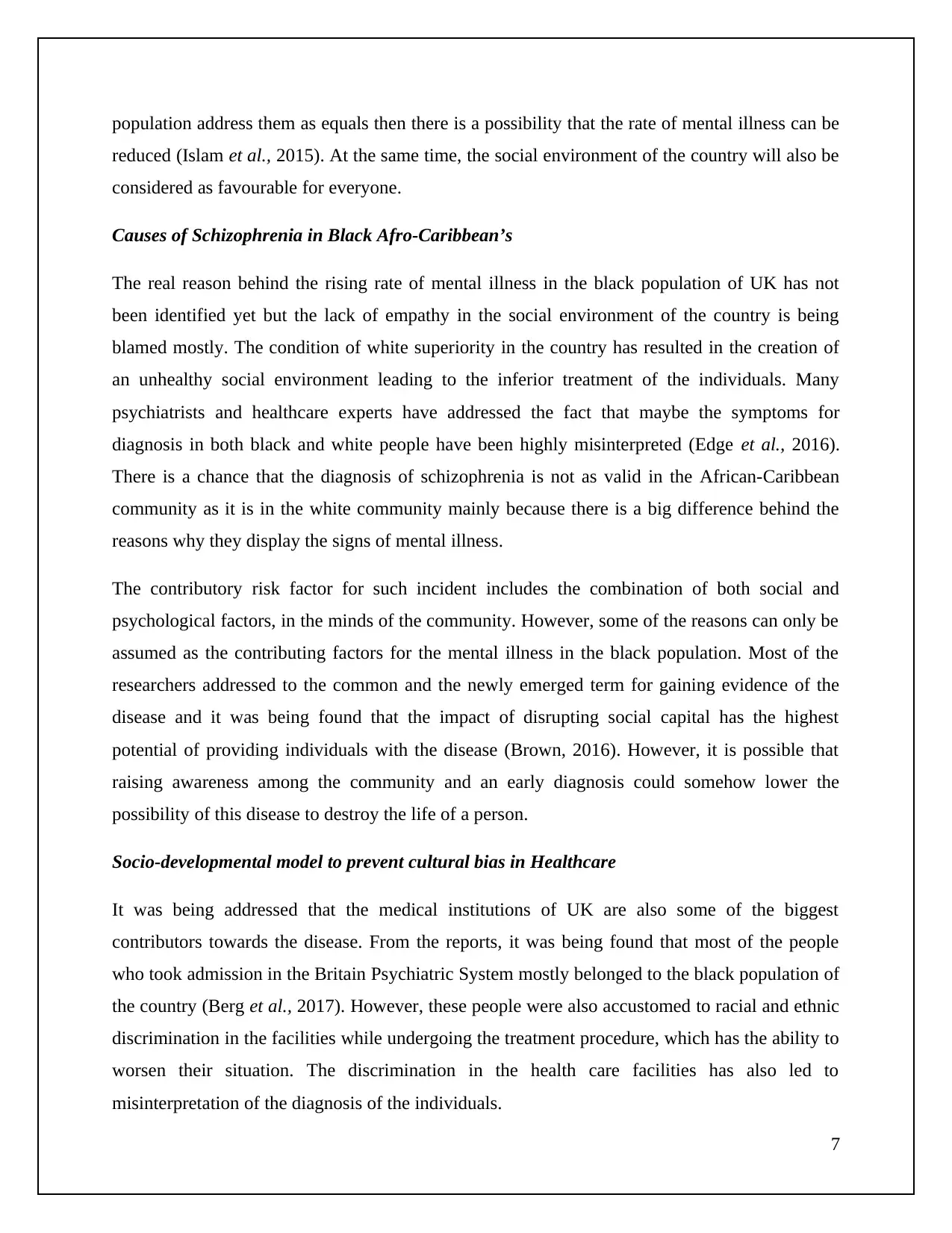
population address them as equals then there is a possibility that the rate of mental illness can be
reduced (Islam et al., 2015). At the same time, the social environment of the country will also be
considered as favourable for everyone.
Causes of Schizophrenia in Black Afro-Caribbean’s
The real reason behind the rising rate of mental illness in the black population of UK has not
been identified yet but the lack of empathy in the social environment of the country is being
blamed mostly. The condition of white superiority in the country has resulted in the creation of
an unhealthy social environment leading to the inferior treatment of the individuals. Many
psychiatrists and healthcare experts have addressed the fact that maybe the symptoms for
diagnosis in both black and white people have been highly misinterpreted (Edge et al., 2016).
There is a chance that the diagnosis of schizophrenia is not as valid in the African-Caribbean
community as it is in the white community mainly because there is a big difference behind the
reasons why they display the signs of mental illness.
The contributory risk factor for such incident includes the combination of both social and
psychological factors, in the minds of the community. However, some of the reasons can only be
assumed as the contributing factors for the mental illness in the black population. Most of the
researchers addressed to the common and the newly emerged term for gaining evidence of the
disease and it was being found that the impact of disrupting social capital has the highest
potential of providing individuals with the disease (Brown, 2016). However, it is possible that
raising awareness among the community and an early diagnosis could somehow lower the
possibility of this disease to destroy the life of a person.
Socio-developmental model to prevent cultural bias in Healthcare
It was being addressed that the medical institutions of UK are also some of the biggest
contributors towards the disease. From the reports, it was being found that most of the people
who took admission in the Britain Psychiatric System mostly belonged to the black population of
the country (Berg et al., 2017). However, these people were also accustomed to racial and ethnic
discrimination in the facilities while undergoing the treatment procedure, which has the ability to
worsen their situation. The discrimination in the health care facilities has also led to
misinterpretation of the diagnosis of the individuals.
7
reduced (Islam et al., 2015). At the same time, the social environment of the country will also be
considered as favourable for everyone.
Causes of Schizophrenia in Black Afro-Caribbean’s
The real reason behind the rising rate of mental illness in the black population of UK has not
been identified yet but the lack of empathy in the social environment of the country is being
blamed mostly. The condition of white superiority in the country has resulted in the creation of
an unhealthy social environment leading to the inferior treatment of the individuals. Many
psychiatrists and healthcare experts have addressed the fact that maybe the symptoms for
diagnosis in both black and white people have been highly misinterpreted (Edge et al., 2016).
There is a chance that the diagnosis of schizophrenia is not as valid in the African-Caribbean
community as it is in the white community mainly because there is a big difference behind the
reasons why they display the signs of mental illness.
The contributory risk factor for such incident includes the combination of both social and
psychological factors, in the minds of the community. However, some of the reasons can only be
assumed as the contributing factors for the mental illness in the black population. Most of the
researchers addressed to the common and the newly emerged term for gaining evidence of the
disease and it was being found that the impact of disrupting social capital has the highest
potential of providing individuals with the disease (Brown, 2016). However, it is possible that
raising awareness among the community and an early diagnosis could somehow lower the
possibility of this disease to destroy the life of a person.
Socio-developmental model to prevent cultural bias in Healthcare
It was being addressed that the medical institutions of UK are also some of the biggest
contributors towards the disease. From the reports, it was being found that most of the people
who took admission in the Britain Psychiatric System mostly belonged to the black population of
the country (Berg et al., 2017). However, these people were also accustomed to racial and ethnic
discrimination in the facilities while undergoing the treatment procedure, which has the ability to
worsen their situation. The discrimination in the health care facilities has also led to
misinterpretation of the diagnosis of the individuals.
7
Paraphrase This Document
Need a fresh take? Get an instant paraphrase of this document with our AI Paraphraser
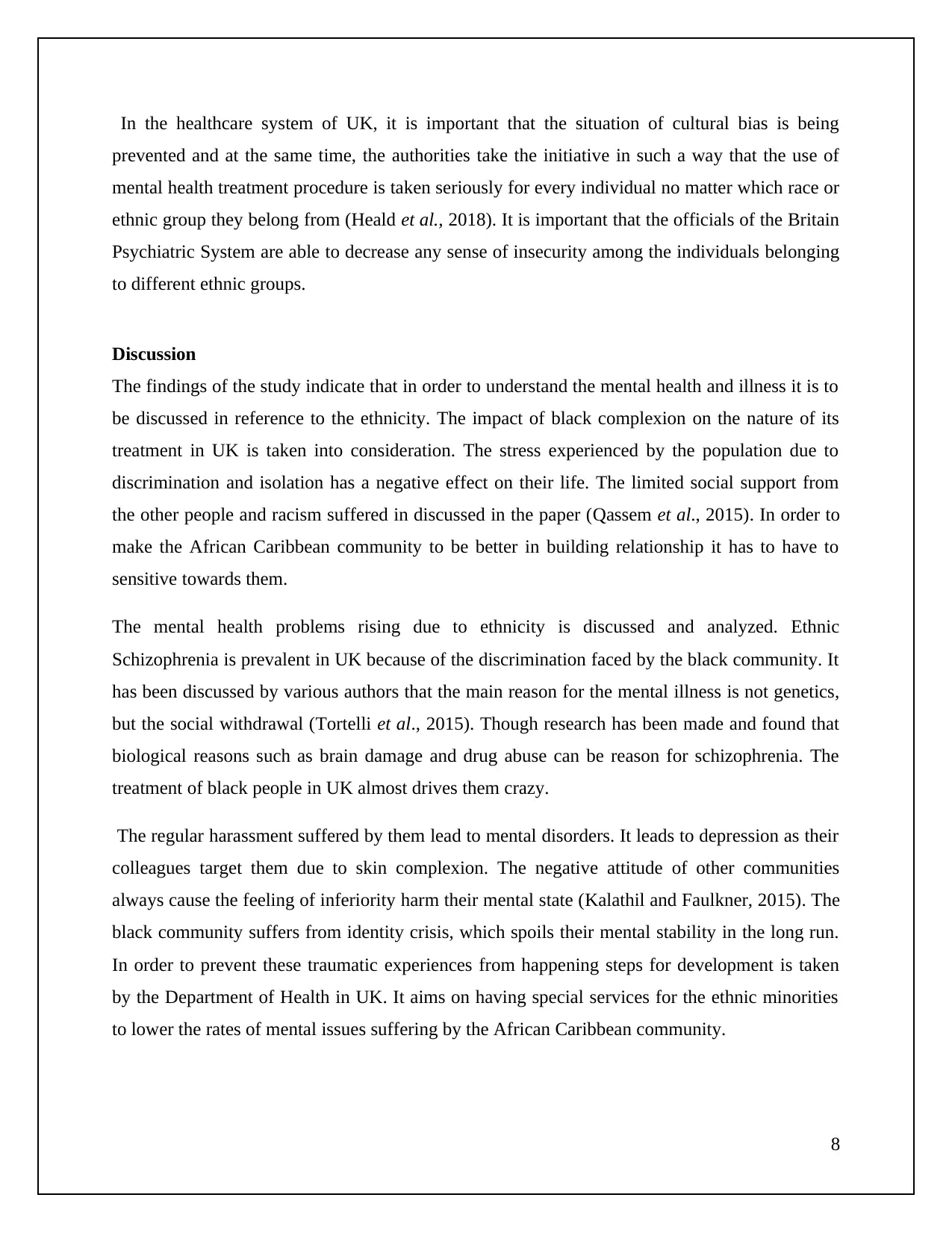
In the healthcare system of UK, it is important that the situation of cultural bias is being
prevented and at the same time, the authorities take the initiative in such a way that the use of
mental health treatment procedure is taken seriously for every individual no matter which race or
ethnic group they belong from (Heald et al., 2018). It is important that the officials of the Britain
Psychiatric System are able to decrease any sense of insecurity among the individuals belonging
to different ethnic groups.
Discussion
The findings of the study indicate that in order to understand the mental health and illness it is to
be discussed in reference to the ethnicity. The impact of black complexion on the nature of its
treatment in UK is taken into consideration. The stress experienced by the population due to
discrimination and isolation has a negative effect on their life. The limited social support from
the other people and racism suffered in discussed in the paper (Qassem et al., 2015). In order to
make the African Caribbean community to be better in building relationship it has to have to
sensitive towards them.
The mental health problems rising due to ethnicity is discussed and analyzed. Ethnic
Schizophrenia is prevalent in UK because of the discrimination faced by the black community. It
has been discussed by various authors that the main reason for the mental illness is not genetics,
but the social withdrawal (Tortelli et al., 2015). Though research has been made and found that
biological reasons such as brain damage and drug abuse can be reason for schizophrenia. The
treatment of black people in UK almost drives them crazy.
The regular harassment suffered by them lead to mental disorders. It leads to depression as their
colleagues target them due to skin complexion. The negative attitude of other communities
always cause the feeling of inferiority harm their mental state (Kalathil and Faulkner, 2015). The
black community suffers from identity crisis, which spoils their mental stability in the long run.
In order to prevent these traumatic experiences from happening steps for development is taken
by the Department of Health in UK. It aims on having special services for the ethnic minorities
to lower the rates of mental issues suffering by the African Caribbean community.
8
prevented and at the same time, the authorities take the initiative in such a way that the use of
mental health treatment procedure is taken seriously for every individual no matter which race or
ethnic group they belong from (Heald et al., 2018). It is important that the officials of the Britain
Psychiatric System are able to decrease any sense of insecurity among the individuals belonging
to different ethnic groups.
Discussion
The findings of the study indicate that in order to understand the mental health and illness it is to
be discussed in reference to the ethnicity. The impact of black complexion on the nature of its
treatment in UK is taken into consideration. The stress experienced by the population due to
discrimination and isolation has a negative effect on their life. The limited social support from
the other people and racism suffered in discussed in the paper (Qassem et al., 2015). In order to
make the African Caribbean community to be better in building relationship it has to have to
sensitive towards them.
The mental health problems rising due to ethnicity is discussed and analyzed. Ethnic
Schizophrenia is prevalent in UK because of the discrimination faced by the black community. It
has been discussed by various authors that the main reason for the mental illness is not genetics,
but the social withdrawal (Tortelli et al., 2015). Though research has been made and found that
biological reasons such as brain damage and drug abuse can be reason for schizophrenia. The
treatment of black people in UK almost drives them crazy.
The regular harassment suffered by them lead to mental disorders. It leads to depression as their
colleagues target them due to skin complexion. The negative attitude of other communities
always cause the feeling of inferiority harm their mental state (Kalathil and Faulkner, 2015). The
black community suffers from identity crisis, which spoils their mental stability in the long run.
In order to prevent these traumatic experiences from happening steps for development is taken
by the Department of Health in UK. It aims on having special services for the ethnic minorities
to lower the rates of mental issues suffering by the African Caribbean community.
8
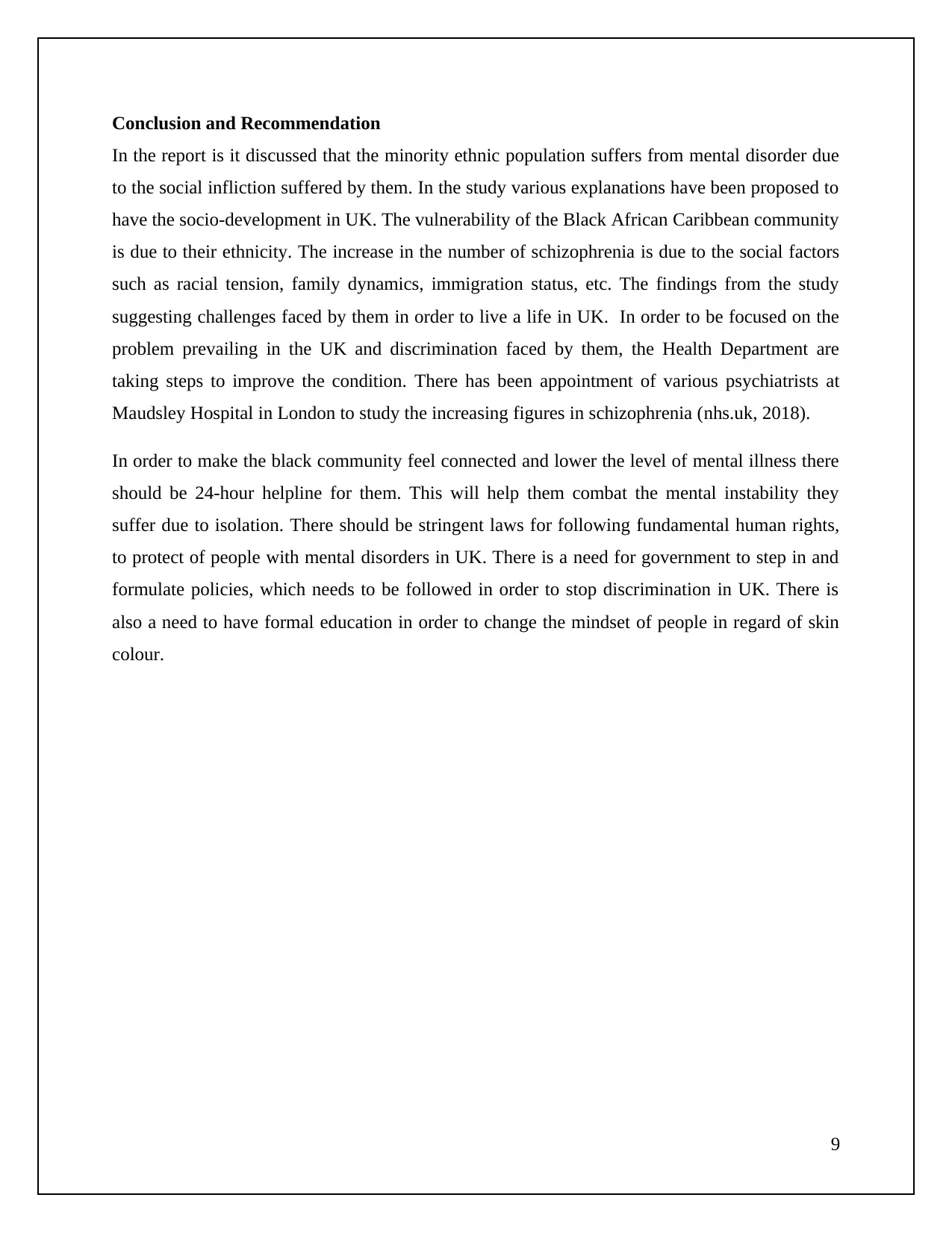
Conclusion and Recommendation
In the report is it discussed that the minority ethnic population suffers from mental disorder due
to the social infliction suffered by them. In the study various explanations have been proposed to
have the socio-development in UK. The vulnerability of the Black African Caribbean community
is due to their ethnicity. The increase in the number of schizophrenia is due to the social factors
such as racial tension, family dynamics, immigration status, etc. The findings from the study
suggesting challenges faced by them in order to live a life in UK. In order to be focused on the
problem prevailing in the UK and discrimination faced by them, the Health Department are
taking steps to improve the condition. There has been appointment of various psychiatrists at
Maudsley Hospital in London to study the increasing figures in schizophrenia (nhs.uk, 2018).
In order to make the black community feel connected and lower the level of mental illness there
should be 24-hour helpline for them. This will help them combat the mental instability they
suffer due to isolation. There should be stringent laws for following fundamental human rights,
to protect of people with mental disorders in UK. There is a need for government to step in and
formulate policies, which needs to be followed in order to stop discrimination in UK. There is
also a need to have formal education in order to change the mindset of people in regard of skin
colour.
9
In the report is it discussed that the minority ethnic population suffers from mental disorder due
to the social infliction suffered by them. In the study various explanations have been proposed to
have the socio-development in UK. The vulnerability of the Black African Caribbean community
is due to their ethnicity. The increase in the number of schizophrenia is due to the social factors
such as racial tension, family dynamics, immigration status, etc. The findings from the study
suggesting challenges faced by them in order to live a life in UK. In order to be focused on the
problem prevailing in the UK and discrimination faced by them, the Health Department are
taking steps to improve the condition. There has been appointment of various psychiatrists at
Maudsley Hospital in London to study the increasing figures in schizophrenia (nhs.uk, 2018).
In order to make the black community feel connected and lower the level of mental illness there
should be 24-hour helpline for them. This will help them combat the mental instability they
suffer due to isolation. There should be stringent laws for following fundamental human rights,
to protect of people with mental disorders in UK. There is a need for government to step in and
formulate policies, which needs to be followed in order to stop discrimination in UK. There is
also a need to have formal education in order to change the mindset of people in regard of skin
colour.
9
⊘ This is a preview!⊘
Do you want full access?
Subscribe today to unlock all pages.

Trusted by 1+ million students worldwide
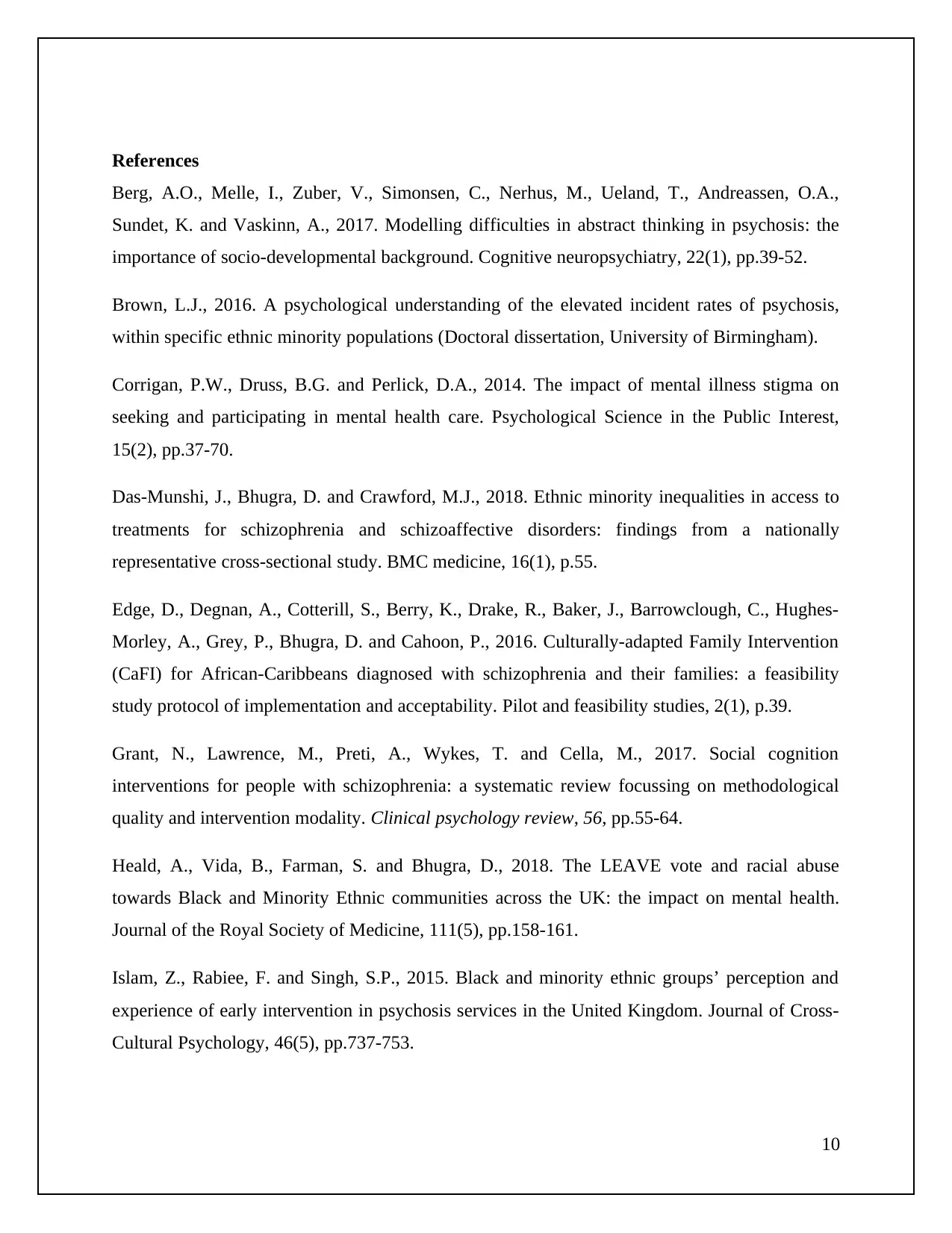
References
Berg, A.O., Melle, I., Zuber, V., Simonsen, C., Nerhus, M., Ueland, T., Andreassen, O.A.,
Sundet, K. and Vaskinn, A., 2017. Modelling difficulties in abstract thinking in psychosis: the
importance of socio-developmental background. Cognitive neuropsychiatry, 22(1), pp.39-52.
Brown, L.J., 2016. A psychological understanding of the elevated incident rates of psychosis,
within specific ethnic minority populations (Doctoral dissertation, University of Birmingham).
Corrigan, P.W., Druss, B.G. and Perlick, D.A., 2014. The impact of mental illness stigma on
seeking and participating in mental health care. Psychological Science in the Public Interest,
15(2), pp.37-70.
Das-Munshi, J., Bhugra, D. and Crawford, M.J., 2018. Ethnic minority inequalities in access to
treatments for schizophrenia and schizoaffective disorders: findings from a nationally
representative cross-sectional study. BMC medicine, 16(1), p.55.
Edge, D., Degnan, A., Cotterill, S., Berry, K., Drake, R., Baker, J., Barrowclough, C., Hughes-
Morley, A., Grey, P., Bhugra, D. and Cahoon, P., 2016. Culturally-adapted Family Intervention
(CaFI) for African-Caribbeans diagnosed with schizophrenia and their families: a feasibility
study protocol of implementation and acceptability. Pilot and feasibility studies, 2(1), p.39.
Grant, N., Lawrence, M., Preti, A., Wykes, T. and Cella, M., 2017. Social cognition
interventions for people with schizophrenia: a systematic review focussing on methodological
quality and intervention modality. Clinical psychology review, 56, pp.55-64.
Heald, A., Vida, B., Farman, S. and Bhugra, D., 2018. The LEAVE vote and racial abuse
towards Black and Minority Ethnic communities across the UK: the impact on mental health.
Journal of the Royal Society of Medicine, 111(5), pp.158-161.
Islam, Z., Rabiee, F. and Singh, S.P., 2015. Black and minority ethnic groups’ perception and
experience of early intervention in psychosis services in the United Kingdom. Journal of Cross-
Cultural Psychology, 46(5), pp.737-753.
10
Berg, A.O., Melle, I., Zuber, V., Simonsen, C., Nerhus, M., Ueland, T., Andreassen, O.A.,
Sundet, K. and Vaskinn, A., 2017. Modelling difficulties in abstract thinking in psychosis: the
importance of socio-developmental background. Cognitive neuropsychiatry, 22(1), pp.39-52.
Brown, L.J., 2016. A psychological understanding of the elevated incident rates of psychosis,
within specific ethnic minority populations (Doctoral dissertation, University of Birmingham).
Corrigan, P.W., Druss, B.G. and Perlick, D.A., 2014. The impact of mental illness stigma on
seeking and participating in mental health care. Psychological Science in the Public Interest,
15(2), pp.37-70.
Das-Munshi, J., Bhugra, D. and Crawford, M.J., 2018. Ethnic minority inequalities in access to
treatments for schizophrenia and schizoaffective disorders: findings from a nationally
representative cross-sectional study. BMC medicine, 16(1), p.55.
Edge, D., Degnan, A., Cotterill, S., Berry, K., Drake, R., Baker, J., Barrowclough, C., Hughes-
Morley, A., Grey, P., Bhugra, D. and Cahoon, P., 2016. Culturally-adapted Family Intervention
(CaFI) for African-Caribbeans diagnosed with schizophrenia and their families: a feasibility
study protocol of implementation and acceptability. Pilot and feasibility studies, 2(1), p.39.
Grant, N., Lawrence, M., Preti, A., Wykes, T. and Cella, M., 2017. Social cognition
interventions for people with schizophrenia: a systematic review focussing on methodological
quality and intervention modality. Clinical psychology review, 56, pp.55-64.
Heald, A., Vida, B., Farman, S. and Bhugra, D., 2018. The LEAVE vote and racial abuse
towards Black and Minority Ethnic communities across the UK: the impact on mental health.
Journal of the Royal Society of Medicine, 111(5), pp.158-161.
Islam, Z., Rabiee, F. and Singh, S.P., 2015. Black and minority ethnic groups’ perception and
experience of early intervention in psychosis services in the United Kingdom. Journal of Cross-
Cultural Psychology, 46(5), pp.737-753.
10
Paraphrase This Document
Need a fresh take? Get an instant paraphrase of this document with our AI Paraphraser
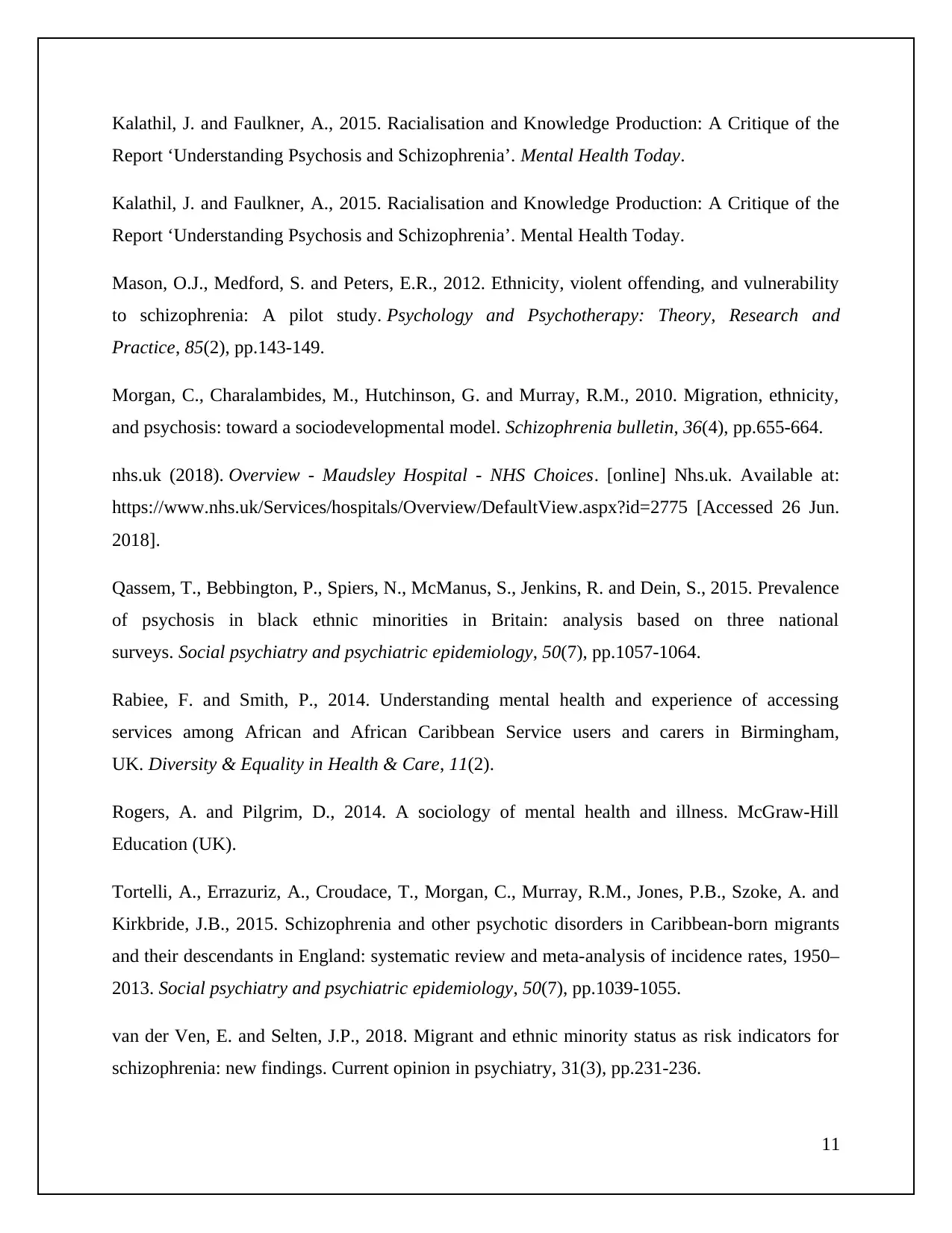
Kalathil, J. and Faulkner, A., 2015. Racialisation and Knowledge Production: A Critique of the
Report ‘Understanding Psychosis and Schizophrenia’. Mental Health Today.
Kalathil, J. and Faulkner, A., 2015. Racialisation and Knowledge Production: A Critique of the
Report ‘Understanding Psychosis and Schizophrenia’. Mental Health Today.
Mason, O.J., Medford, S. and Peters, E.R., 2012. Ethnicity, violent offending, and vulnerability
to schizophrenia: A pilot study. Psychology and Psychotherapy: Theory, Research and
Practice, 85(2), pp.143-149.
Morgan, C., Charalambides, M., Hutchinson, G. and Murray, R.M., 2010. Migration, ethnicity,
and psychosis: toward a sociodevelopmental model. Schizophrenia bulletin, 36(4), pp.655-664.
nhs.uk (2018). Overview - Maudsley Hospital - NHS Choices. [online] Nhs.uk. Available at:
https://www.nhs.uk/Services/hospitals/Overview/DefaultView.aspx?id=2775 [Accessed 26 Jun.
2018].
Qassem, T., Bebbington, P., Spiers, N., McManus, S., Jenkins, R. and Dein, S., 2015. Prevalence
of psychosis in black ethnic minorities in Britain: analysis based on three national
surveys. Social psychiatry and psychiatric epidemiology, 50(7), pp.1057-1064.
Rabiee, F. and Smith, P., 2014. Understanding mental health and experience of accessing
services among African and African Caribbean Service users and carers in Birmingham,
UK. Diversity & Equality in Health & Care, 11(2).
Rogers, A. and Pilgrim, D., 2014. A sociology of mental health and illness. McGraw-Hill
Education (UK).
Tortelli, A., Errazuriz, A., Croudace, T., Morgan, C., Murray, R.M., Jones, P.B., Szoke, A. and
Kirkbride, J.B., 2015. Schizophrenia and other psychotic disorders in Caribbean-born migrants
and their descendants in England: systematic review and meta-analysis of incidence rates, 1950–
2013. Social psychiatry and psychiatric epidemiology, 50(7), pp.1039-1055.
van der Ven, E. and Selten, J.P., 2018. Migrant and ethnic minority status as risk indicators for
schizophrenia: new findings. Current opinion in psychiatry, 31(3), pp.231-236.
11
Report ‘Understanding Psychosis and Schizophrenia’. Mental Health Today.
Kalathil, J. and Faulkner, A., 2015. Racialisation and Knowledge Production: A Critique of the
Report ‘Understanding Psychosis and Schizophrenia’. Mental Health Today.
Mason, O.J., Medford, S. and Peters, E.R., 2012. Ethnicity, violent offending, and vulnerability
to schizophrenia: A pilot study. Psychology and Psychotherapy: Theory, Research and
Practice, 85(2), pp.143-149.
Morgan, C., Charalambides, M., Hutchinson, G. and Murray, R.M., 2010. Migration, ethnicity,
and psychosis: toward a sociodevelopmental model. Schizophrenia bulletin, 36(4), pp.655-664.
nhs.uk (2018). Overview - Maudsley Hospital - NHS Choices. [online] Nhs.uk. Available at:
https://www.nhs.uk/Services/hospitals/Overview/DefaultView.aspx?id=2775 [Accessed 26 Jun.
2018].
Qassem, T., Bebbington, P., Spiers, N., McManus, S., Jenkins, R. and Dein, S., 2015. Prevalence
of psychosis in black ethnic minorities in Britain: analysis based on three national
surveys. Social psychiatry and psychiatric epidemiology, 50(7), pp.1057-1064.
Rabiee, F. and Smith, P., 2014. Understanding mental health and experience of accessing
services among African and African Caribbean Service users and carers in Birmingham,
UK. Diversity & Equality in Health & Care, 11(2).
Rogers, A. and Pilgrim, D., 2014. A sociology of mental health and illness. McGraw-Hill
Education (UK).
Tortelli, A., Errazuriz, A., Croudace, T., Morgan, C., Murray, R.M., Jones, P.B., Szoke, A. and
Kirkbride, J.B., 2015. Schizophrenia and other psychotic disorders in Caribbean-born migrants
and their descendants in England: systematic review and meta-analysis of incidence rates, 1950–
2013. Social psychiatry and psychiatric epidemiology, 50(7), pp.1039-1055.
van der Ven, E. and Selten, J.P., 2018. Migrant and ethnic minority status as risk indicators for
schizophrenia: new findings. Current opinion in psychiatry, 31(3), pp.231-236.
11
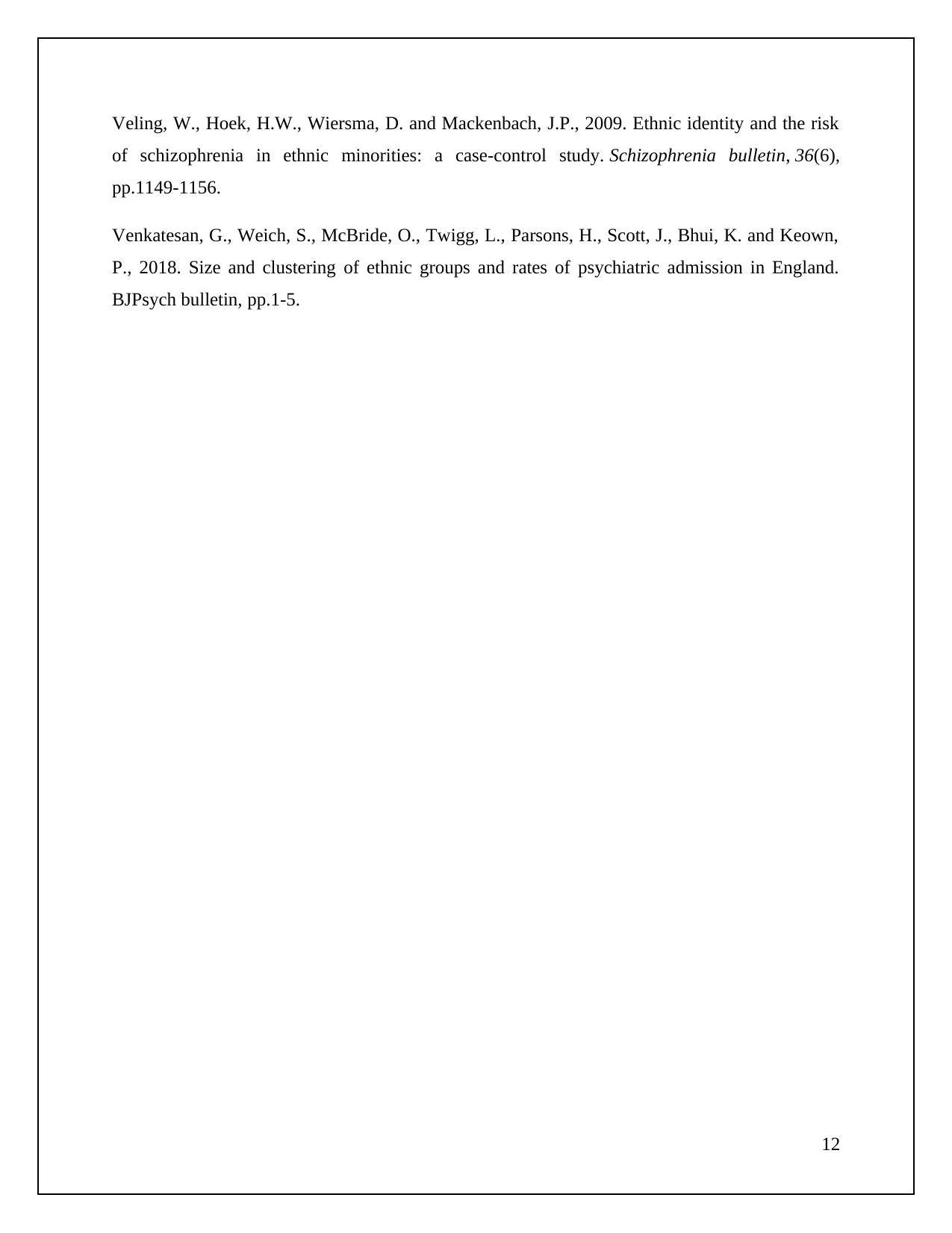
Veling, W., Hoek, H.W., Wiersma, D. and Mackenbach, J.P., 2009. Ethnic identity and the risk
of schizophrenia in ethnic minorities: a case-control study. Schizophrenia bulletin, 36(6),
pp.1149-1156.
Venkatesan, G., Weich, S., McBride, O., Twigg, L., Parsons, H., Scott, J., Bhui, K. and Keown,
P., 2018. Size and clustering of ethnic groups and rates of psychiatric admission in England.
BJPsych bulletin, pp.1-5.
12
of schizophrenia in ethnic minorities: a case-control study. Schizophrenia bulletin, 36(6),
pp.1149-1156.
Venkatesan, G., Weich, S., McBride, O., Twigg, L., Parsons, H., Scott, J., Bhui, K. and Keown,
P., 2018. Size and clustering of ethnic groups and rates of psychiatric admission in England.
BJPsych bulletin, pp.1-5.
12
⊘ This is a preview!⊘
Do you want full access?
Subscribe today to unlock all pages.

Trusted by 1+ million students worldwide
1 out of 12
Related Documents
Your All-in-One AI-Powered Toolkit for Academic Success.
+13062052269
info@desklib.com
Available 24*7 on WhatsApp / Email
![[object Object]](/_next/static/media/star-bottom.7253800d.svg)
Unlock your academic potential
Copyright © 2020–2026 A2Z Services. All Rights Reserved. Developed and managed by ZUCOL.





